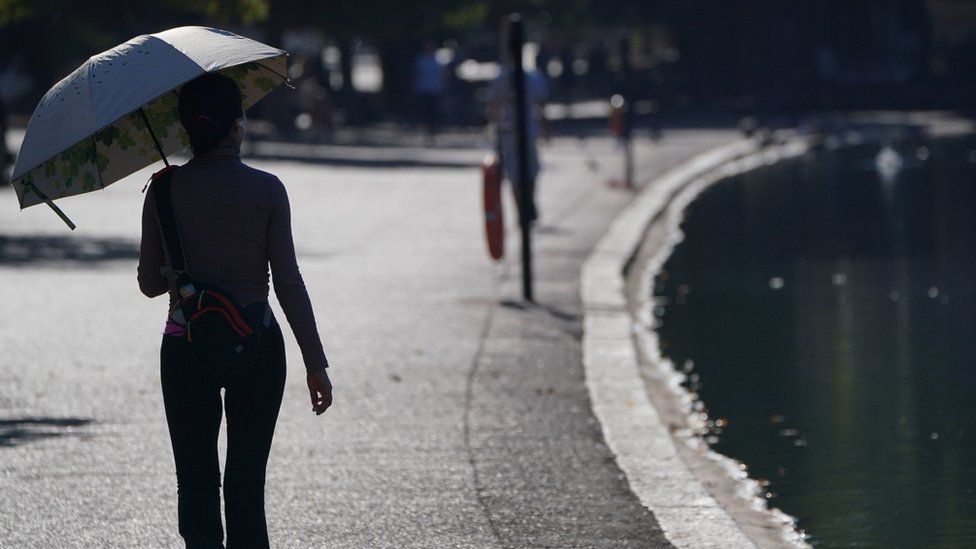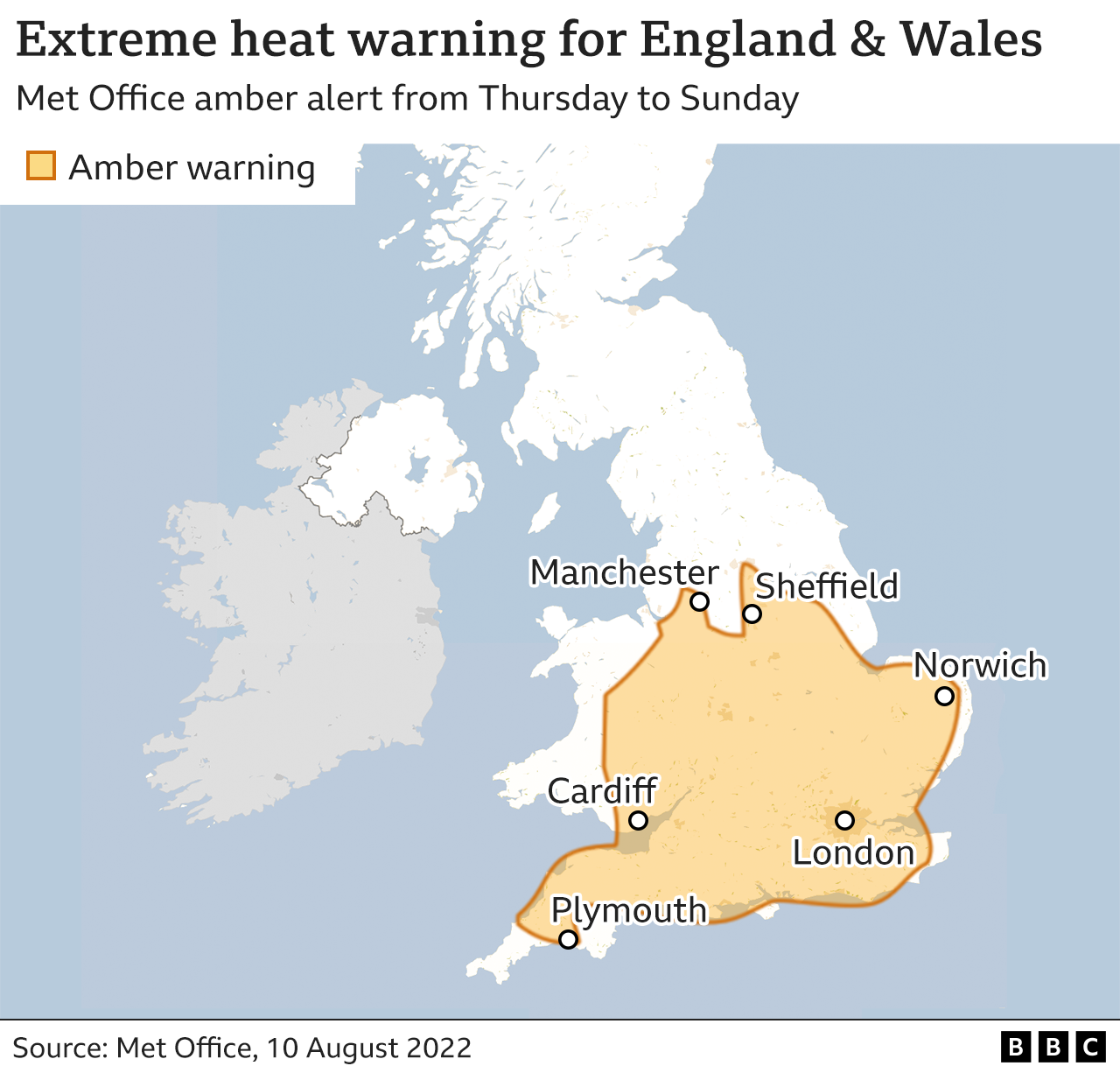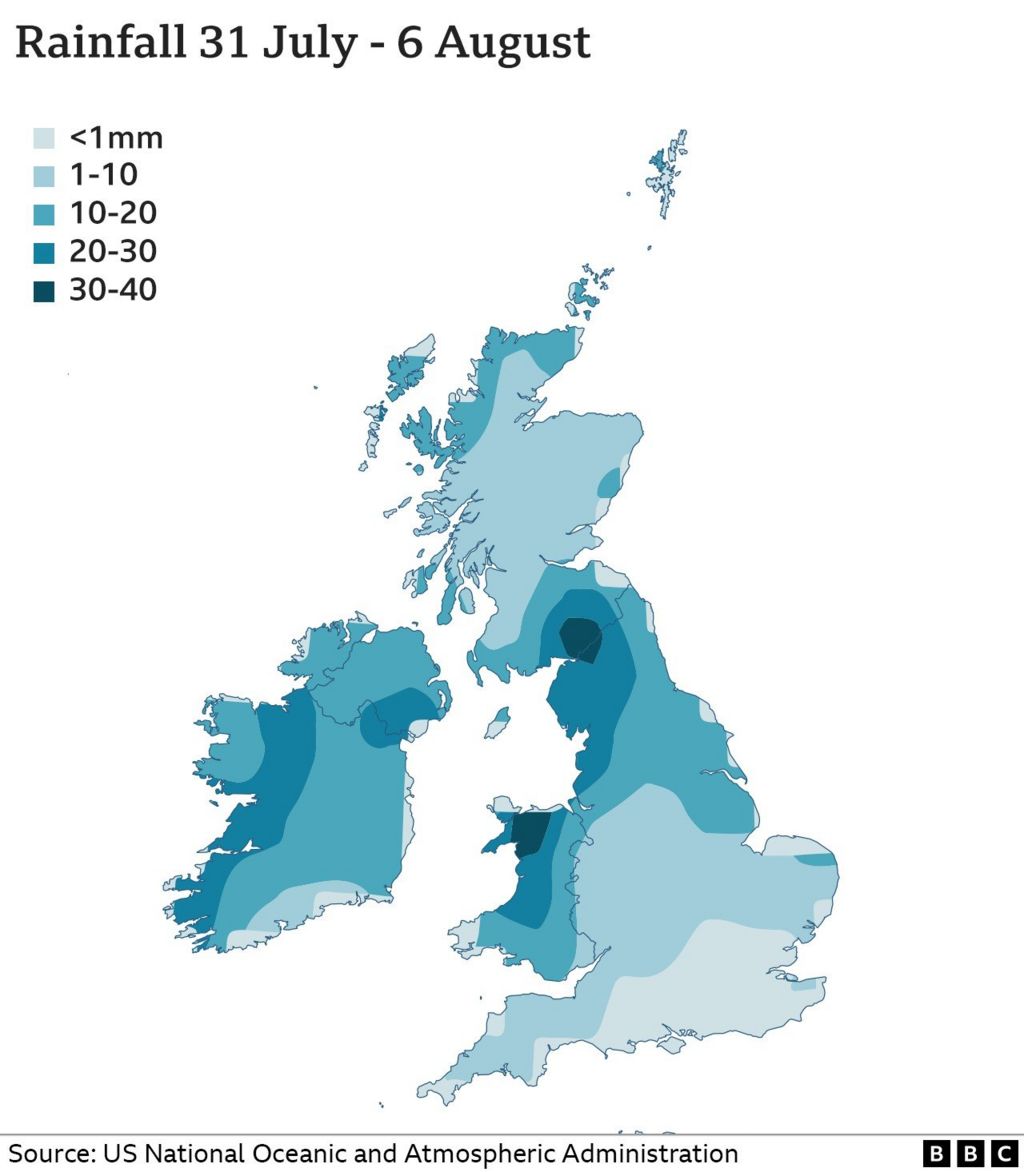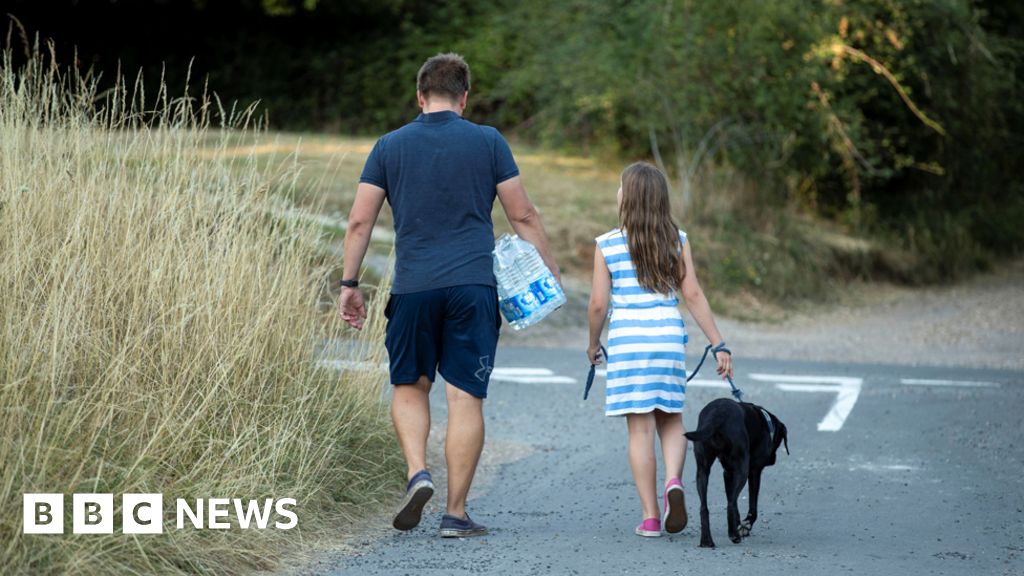 PA Media
PA MediaAn amber extreme heat warning has come into force, with temperatures forecast to hit 37C (99F) in some parts of the UK over the next four days.
The Met Office alert for southern and central England and parts of Wales runs from midnight on Thursday until Sunday.
It has also issued its highest alert for fire severity over the weekend, warning there is an “exceptional” risk of blazes spreading in many places.
The heatwave will likely affect health, transport and working conditions.
There is also an increased risk of water safety incidents, the Met Office warned.
While the record-breaking temperatures seen in July, when the mercury topped 40C (104F) for the first time, are not expected this week, the heat in some areas could get close to local or regional records.
“Temperatures won’t be as high. But the big difference with this current heatwave is that it’s much more prolonged,” said Matt Taylor, a BBC Weather forecaster.
“We’ve already seen temperatures above 30C every day this week – Monday, Tuesday and Wednesday – and that will continue until Sunday.”
The high temperatures and dry conditions have also been causing problems across Europe – with more than 1,000 firefighters battling a “monster” wildfire in France that has destroyed nearly 7,000 hectares of forest.

He said temperatures could reach 35C and peak at 37C in some areas between the Midlands and London.
In Wales, Cardiff may see temperatures exceeding 30C.
Scotland and Northern Ireland meanwhile are likely to be cooler with the highest temperatures in the mid-20s, the Met Office says.
The Met Office’s fire severity index, which assesses how severe a blaze could become, is currently “very high” for most of England and Wales.
This will rise to “exceptional” – the highest level of risk – for parts of England and Wales by the weekend, while a warning for “very high” risk of wildfires across southern and eastern Scotland has been put in place until Monday.
This video can not be played
To play this video you need to enable JavaScript in your browser.
The period between January and June this year was the driest in England in 46 years, prompting warnings about the effects on agriculture, nature and wildlife.
More than three inches of extra rain, in addition to what would normally be expected, is needed to overcome the dry conditions in parts of southern England, but no rain is forecast any time soon.
Analysis by the UK Centre for Ecology and Hydrology found low or even exceptionally low river flows and groundwater levels were likely to continue for the next three months in southern England and Wales.
Water companies are being urged to protect essential supplies into a dry autumn, while three firms have already implemented hosepipe bans.
Fire services have issued warnings about the increased risk during dry and hot conditions, with London Fire Brigade calling for a “partnership” between emergency services and the public to help prevent fires.
Jonathan Smith from the London Fire Brigade said he wanted to avoid the scenes in July “where people lost their homes and livelihoods”.
“In the first week of August last year, we attended 42 grassland and wildland fires, the same week this year we’ve attended 340”, he added.
Mr Smith also warned people against using barbecues on balconies, saying they can lead to ash moving “very quickly”.
This video can not be played
To play this video you need to enable JavaScript in your browser.
South East, Southern and Welsh Water customers cannot use hosepipes to water lawns or plants, clean cars or fill paddling pools, while Thames Water expects to bring in a ban “in the coming weeks”.
The company, with 15 million customers across London and the Thames Valley, was forced on Wednesday to hand out bottled water for residents in the village of Northend in Oxfordshire after supplies were disrupted due to a technical issue at a local reservoir.
To help footballers in the hot weather this weekend, drinks breaks are being implemented during Premier League fixtures.
There have been calls from the Angling Trust for the government to declare a drought and for water companies to “stop dragging their feet” and implement hosepipe bans in all affected areas as rivers dry up, hitting fish and other species.
The charity’s Martin Salter said reservoir levels in some parts of the country were at 43% capacity, rivers, including parts of the Thames, were drying up and there were reports of fish dying “from Shropshire to Sussex”.
He said “millions of gallons of scarce water is being wasted” on lawns and golf courses when they should be used to help rivers survive and protect wildlife and the economy.
Speaking on the BBC’s Today programme, Mr Salter warned: “If we have a dry winter, we are looking at a cataclysmic situation next year and we really need to start saving water now.”
Water companies have faced criticism for bringing in hosepipe bans while just under 3 billion litres (660 million gallons) of water is lost to leaks every day in England and Wales – equivalent to 1,180 Olympic swimming pools.
Stuart Colville from Water UK said there were “hundreds of people out today and across the week” fixing leaks – adding that leakage was currently at its lowest level on record.
He said it was a “constant battle” fixing leaks – particularly in hot and dry conditions – where the soil dries, moves and puts additional pressure on pipes “causing additional bursts”.
Speaking on BBC Breakfast, Mr Colville said it was looking “increasingly inevitable” that the Environment Agency would declare a drought.

One farmer in Horsham, Sussex said it had been “an exceptional year” and described his land as being like a “Sussex savannah”.
Speaking on BBC Radio 2, David Exwood emphasised the “extreme risk” of taking barbecues into the countryside – explaining how hard and dry the ground was.
There might be some disruption to train services during the hot weather, but it is not expected to be on the same scale as July when the UK recorded its hottest day on record.
Network Rail is not bringing in a country-wide blanket speed restriction, but some local services might have restrictions with concerns rail temperatures could reach 55C or higher.
Environment Secretary George Eustice met water company bosses on Wednesday, who he said had assured him that water supplies remained resilient across Britain.
“Each company has a pre-agreed drought plan which they are following, and I have urged them to take any precautionary steps needed to protect essential supplies as we go into a likely very dry autumn,” he said.
An official drought is expected to be declared on Friday, according to water industry insiders, meaning the Environment Agency would have more control over water supply.
Meanwhile, people are being advised to look out for those who are older or vulnerable, as well as young children, after the UK Health Security Agency issued a heat health alert until Sunday for parts of central, southern and northern England.
Heatwaves are becoming more likely and more extreme because of human-induced climate change.
The world has already warmed by about 1.1C since the industrial era began, and temperatures will keep rising unless governments around the world make steep cuts to emissions.

How have you been affected by the heatwave? You can share your experience by emailing: haveyoursay@bbc.co.uk.
Please include a contact number if you are willing to speak to a BBC journalist. You can also get in touch in the following ways:
- WhatsApp: +44 7756 165803
- Tweet: @BBC_HaveYourSay
- Or fill out the form below
- Please read our terms & conditions and privacy policy
If you are reading this page and can’t see the form you will need to visit the mobile version of the BBC website to submit your question or comment or you can email us at HaveYourSay@bbc.co.uk. Please include your name, age and location with any submission.

- EASY RECIPES FOR KIDS: Want to get the kids enjoying cooking?
- FROM MOUNTAINS TO DESERTS: Six of the world’s most amazing railway journeys

-
-
18 July

-


